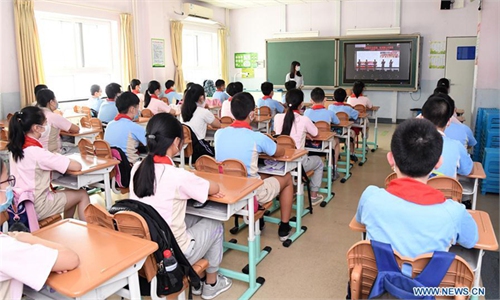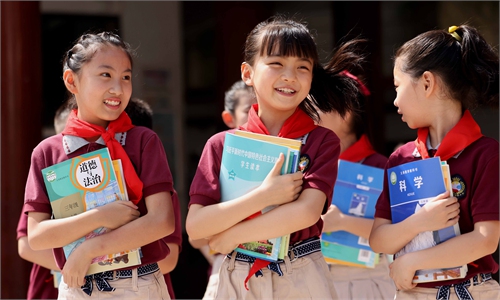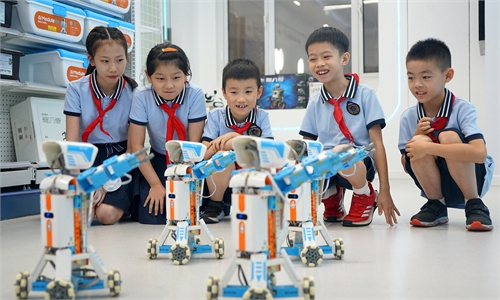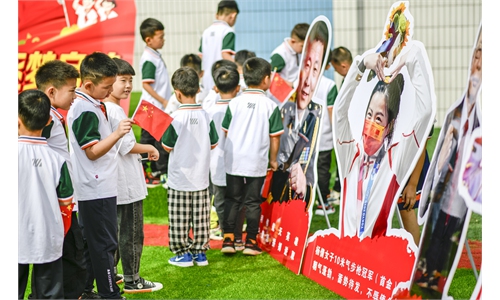New semester begins as China rolls out 'most strict measures in decades' to ease students' burden
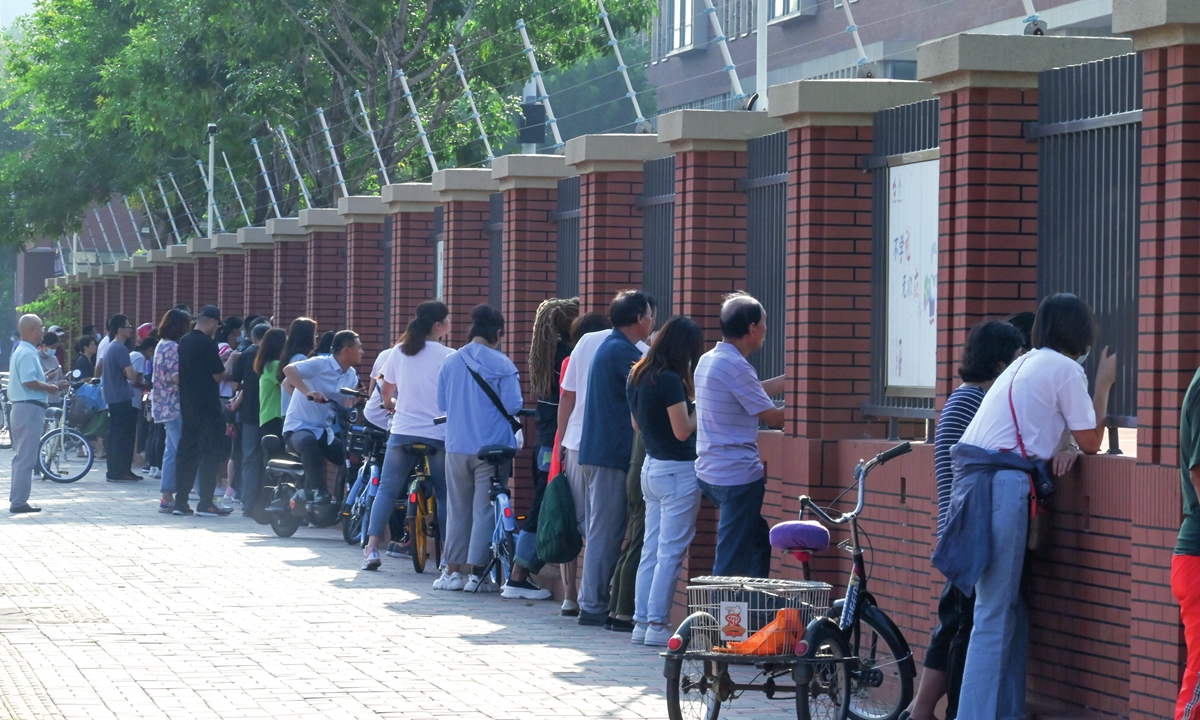
Parents peer through the fence of an elementary school in North China's Tianjin on the first day of the fall semester on Wednesday. Schools across China welcomed students back after China rolled out the "strictest measures in decades" to ease students' burden. Photo: IC
Schools all over China on Wednesday began the routine procedure of welcoming their students' return. Yet this semester is special.
Since July, when the students were enjoying summer vacation, the Chinese government has rolled out a slew of measures, dubbed "double reduction," also described as the "most stringent in decades" by Chinese analysts, to ease burdens and anxiety for students and parents alike, including suspending off-campus curriculum subject tutoring courses for students on national holidays, and reducing the frequency of exams. Analysts said the reform not only turned the tide against the growing unrestrained competition in children's education, but also guaranteed China's next generation a healthier, more balanced and diverse upbringing.
On Wednesday, the first day of the new semester, Beijing resident Li Yu (pseudonym) was surprised to see her fourth-grade daughter watching cartoons after class was dismissed, the first time since her daughter started school.
"I'm just not used to her coming home without any homework," Li said.
The Global Times on Wednesday learnt from several elementary and secondary schools across China that they have launched support measures to cope with the "double reduction."
Some schools in Beijing, Shanghai and Chongqing have rescheduled school hours, starting after 8 am, and arranging about two hours of "after-school time" for students after 3:30 pm, when students can participate in the arts, sports and academic tutorials based on their interests, supervised by teachers.
"Students get their homework done at school under teachers' guidance, enjoy their after-school time, and have enough sleep" are the goals of the new school year, a teacher surnamed Suo from an elementary school in Beijing, told the Global Times.
Zhou Chunhong, vice president of the Beijing-based Jinyuan School, a full-time boarding school integrating kindergarten, elementary and secondary schools and an international department, told the Global Times that the school will arrange sports competitions and exercises for students, such as ball games, track and field sports and ice and snow sports.
In addition to sports clubs, the school also has arts, science and technology clubs. Students can choose a club according to what they are interested in. The Peking Opera society is one of the notable societies of the school, according to Zhou.
Li Yu, the Beijing parent, hailed the new policies as a "good start." "I think [double reduction] can give back a happy childhood for my child."
Since July, the government put a lid on the country's chaotic and massive off-campus tutorial industry, restricting it from offering curriculum subject-tutoring courses during holidays and weekends. At a Monday conference, the Ministry of Education (MOE) said that first and second graders should not be given written examinations. For other grades, schools should give only one final examination every semester, compared with previous practices of jamming multiple exams into a semester.
The ministry also banned schools setting up "priority" classes for gifted students.
Education analysts say it is "the most stringent measures in decades" to assuage pressure and anxiety of students and parents.
An expert from a research institute affiliated with the MOE told the Global Times that "the problem in our education evaluation system has resulted in an excessive burden on students and parents. We've been talking about easing the burden on students for years, yet there was no substantial result," said the expert, noting that this time the government is determined to make it right.
New concerns
After the policies were released, some parents are fretting about how those policies will be implemented, or if it will give rise to a new type of education inequality, where the burden for a child from average families is shaken off, while families with more money would have private tutorials for their children at home.
In order to better implement those rules, the MOE on Wednesday issued the first document since the founding of the People's Republic of China to hold entities, including local governments, relevant departments, schools and other educational institutions, accountable for activities that hamper the development of education, including lack of resolution and commitment in implementing national policies.
Chu Zhaohui, a research fellow at the National Institute of Education Sciences hailed the MOE's move as smoothening the nerves of some parents who were questioning the implementation of the "double reduction" policies. "Holding people accountable for those infringements means the government is serious about reducing burden this time. This effort will help schools and other entities focus on what they should be focused on, which are classes and campuses."
The anonymous expert said that there will inevitably be issues during this type of reform, yet the reform will lead the country's education system in a healthier direction and create a better growth environment for students.
He predicted that changes to the student evaluation system will come at the end of the reform, which means the scores-oriented system will eventually be reformed. "In the future, grades will be a less dominant factor in evaluating a student's ability. That means students will be less dependent on tutorials."
The most important lesson
Although students may undergo tremendous changes during the new semester, the tradition for them to watch "First Class for New Semester," a TV show produced by China Central Television (CCTV) and the MOE, remains.
Themed "to shine the future with ideals" this year, the program featured stories of the founding of the Communist Party of China (CPC), as 2021 marks the 100th anniversary of the founding of the Party, the Shenzhou-12 crew and Tokyo Olympics medalists to inspire Chinese youth to learn stories about hope and create a better future.
A middle school in Nanchang, East China's Jiangxi Province, also where the CPC staged an uprising against the Kuomintang, organized students to visit revolutionary sites on the first day of school. Officials from the school said in an interview that this is to "train students to shoulder great ambition and take the responsibility of rejuvenating our country."
"Many of our classmates including me watched the grand ceremony to celebrate the birthday of the Party on July 1, and later I read some of the Party's founding members' stories. Inspired by them, I'm determined to improve and enrich myself since the new school year and aimed to become someone who can make contributions to the country," a student surnamed Wu in Changchun, Northeast China's Jilin Province, told the Global Times.
Some youth's enthusiasm for sports was rekindled by the Tokyo Olympics. As the Beijing Winter Olympic Games are approaching, several schools across China reached by the Global Times said they plan to promote information about the Games during the first week of the new school year. Also, Jingyuan School in Beijing on Wednesday encouraged secondary students to apply to be volunteers for the Games.
Zhang Yiwu, a professor at Peking University said that these examples of achievement showcase to young students how the country, the Party and outstanding people have achieved what they achieved for now.
"The most important lesson should be for young students, future nation builders, to establish national confidence and cultivate a strong sense of national identity in them," Zhang said.


